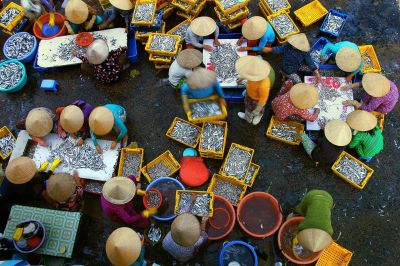Resilience Index and Measurement Analysis 2018
Uganda, 2018
Get MicrodataIdentification
UGA_2018_RIMA_v01_EN_M_v01_A_OCS
Resilience Index and Measurement Analysis 2018
| Name | Country code |
|---|---|
| Uganda | UGA |
Other Household Survey [hh/oth]
The Uganda 2018 Resilience Index Measurement and Analysis (RIMA) measures the food security and resilience of refugees and host communities in South-West Uganda. The survey was administered in March 2018 in two districts of Southwest Uganda. The data were collected through surveys of both refugee and host community households, coordinated by the Resilience Measurement Unit (RMU) of the Office of the Prime Minister (OPM). The survey covered a total of 705 households from refugee and host communities. It was conducted in the settlements of Kyaka II and Rwamwanja (housing refugees from Burundi and the DRC, among other countries), as well as nearby host communities in the districts of Kyegegwa (for Kyaka II) and Kamwenge (for Rwamwanja).
Sample survey data [ssd]
Households
Scope
The description of scope for the survey includes:
- Socio-demographic characteristics of households;
- Food security, including a detailed food consumption module, and well-being;
- Shocks, assistance, perceived resilience capacity, coping strategies and aspirations;
- Access to basic services;
- Employment;
- Agricultural and livestock production, comprising questions regarding the land which a household owns or over which it has user rights.
Coverage
Regional Coverage
Refugees and host community households
Producers and sponsors
| Name |
|---|
| Food and Agriculture Organization of the United Nations |
| Resilience Measurement Unit |
| United Nations Children's Fund |
| World Food Programme |
| Uganda Bureau of Statistics |
| Office of the Prime Minister of Uganda |
| Name | Role |
|---|---|
| Inter-Governmental Authority on Development/Resilience Analysis Unit | Technical Support |
| Name | Role |
|---|---|
| Food and Agriculture Organization of the United Nations | Financial support |
| European Union | Financial support |
Sampling
The sample includes 705 households in total, of which 395 are refugee households (202 in the Kyegegwa District and 193 in the Kamwenge District) and 310 are part of the host communities (158 in the Kyegegwa District and 152 in the Kamwenge District). The sample size is determined based on power of design, which, in addition to taking into account the size of the population, uses the estimated impact we expect to see based on previous exercises, the standard deviations on the main indicator of interest (FAO-RCI), as well as measures to reduce possible estimation errors. The sample size has been calculated in order to be able to detect a minimum impact of 10 percent, with a 95 percent level of confidence. Other assumptions include (i) a null expectation in differences between the two populations (refugee/host) at the beginning, but possibly seeing one over time; (ii) a correlation between the resilience capacity between the two groups of 0.4 and 0.5; (iii) differences in the standard deviations between the two groups, i.e. more homogeneous characteristics amongst the host communities than the refugees; and (iv) intra-cluster correlation. This estimation was done at both settlement and district level clusters. The 20 percent oversampling was added at settlement level, to account for the expected fluid nature of refugee status. The sample is representative at district and settlement levels.
No weighting.
Data collection
| Start | End |
|---|---|
| 2018-03-02 | 2018-03-23 |
- Computer Assisted Personal Interview [capi]
Data processing
The data were collected through computer-assisted personal interviewing (CAPI) with digital tablets. The use of electronic devices reduces the duration of interviews, limits errors during the interview and data entry phases, and enables the collection of geographic information system (GIS) information at the household level. The data were transmitted daily through Kobo Toolbox, a suite of software tools for data collection in challenging environments, allowing for the use of remote data control protocols.
Data Access
| Is signing of a confidentiality declaration required? | Confidentiality declaration text |
|---|---|
| yes | The users shall not take any action with the purpose of identifying any individual entity (i.e. person, household, enterprise, etc.) in the micro dataset(s). If such a disclosure is made inadvertently, no use will be made of the information, and it will be reported immediately to FAO |
Micro datasets disseminated by FAO shall only be allowed for research and statistical purposes. Any user which requests access working for a commercial company will not be granted access to any micro dataset regardless of their specified purpose. Users requesting access to any datasets must agree to the following minimal conditions:
- The micro dataset will only be used for statistical and/or research purposes;
- Any results derived from the micro dataset will be used solely for reporting aggregated information, and not for any specific individual entities or data subjects;
- The users shall not take any action with the purpose of identifying any individual entity (i.e. person, household, enterprise, etc.) in the micro dataset(s). If such a disclosure is made inadvertently, no use will be made of the information, and it will be reported immediately to FAO;
- The micro dataset cannot be re-disseminated by users or shared with anyone other than the individuals that are granted access to the micro dataset by FAO.
FAO. Resilience Index Measurement and Analysis (RIMA), Uganda, 2018. Dataset downloaded from https://microdata.fao.org.
Disclaimer and copyrights
The user of the data acknowledges that the original collector of the data, the authorized distributor of the data, and the relevant funding agency bear no responsibility for use of the data or for interpretations or inferences based upon such uses
Contacts
| Name | Affiliation | |
|---|---|---|
| FAO RIMA Team | Food and Agriculture Organization | [email protected] |
Metadata production
DDI_UGA_2018_RIMA_v01_EN_M_v01_A_OCS_FAO
| Name | Affiliation | Role |
|---|---|---|
| Jeanne Pinay | Food and Agriculture Organization | Metadata producer |
| Office of Chief Statistician | Food and Agriculture Organization | Metadata adapted for FAM |
Metadata version
UGA_2018_RIMA_v01_EN_M_v01_A_OCS_v01
